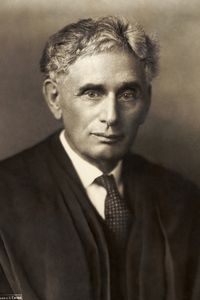Louis Brandeis
Louis Dembitz Brandeis (1856-1941) was an Associate Justice on the Supreme Court of the United States. He joined the court in 1916 after a nomination from President Woodrow Wilson. On February 13, 1939, he assumed senior status and served in this capacity until his death on October 5, 1941. Prior to joining the court, Brandeis was a private practice attorney in Boston.[1]
Brandeis was one of three justices nominated to the Supreme Court by President Wilson. He served during The White Court, The Taft Court and The Hughes Court.[2]
Education
Brandeis received his LL.B. from Harvard Law School in 1877.[1]
Professional career
- 1879-1916: Attorney in private practice, Boston, Massachusetts
- 1879-1880: Law clerk, Hon. Horace Gray, Supreme Judicial Court of Massachusetts
- 1878-1879: Attorney in private practice, St. Louis, Missouri
- 1882-1883: Instructor, Harvard Law School[1]
Judicial nominations and appointments
Supreme Court of the United States
Brandeis was nominated by President Woodrow Wilson on January 28, 1916, to fill the seat vacated by Joseph Rucker Lamar. He was confirmed by the Senate on June 1, 1916, and received commission that same day. On February 13, 1939, Brandeis assumed senior status. He served in this capacity until his death on October 5, 1941.[1] He was succeeded to this post by Justice William Douglas.
Noteworthy cases
| Details |
|---|
| Author: Louis Brandeis
Vote Count: 9-0 Majority Justices: Hughes, Van Devanter, McReynolds, Sutherland, Butler, Stone, Roberts, Cordoza |
Bank has the right to collect what is owed (1935)
On June 28, 1934, the Frazier-Lemke Act was passed by Congress. The Supreme Court found that the Act allowed others "to take valuable rights in specific property from one person and give them to another, in violation of the Constitution." The Court declared the Act to be in violation of the Fifth Amendment. The justices agreed that the bank had the right to collect what was due.[3][4]
Approach to the law
Quotes
- "The most important political office is that of private citizen."[5]
- "In the frank expression of conflicting opinions lies the greatest promise of wisdom in governmental action."[5]
- "Those who won our independence believed that the final end of the State was to make men free to develop their faculties... They valued liberty both as an end and as a means. They believed liberty to be the secret of happiness and courage to be the secret of liberty."[5]
- "Ways may someday be developed by which the government, without removing papers from secret drawers, can reproduce them in court, and by which it will be enabled to expose to a jury the most intimate occurrences of the home."[5]
- "We can have democracy in this country, or we can have great wealth concentrated in the hands of a few, but we can’t have both."[5]
- "Experience should teach us to be most on our guard to protect liberty when the Government's purposes are beneficent. Men born to freedom are naturally alert to repel invasion of their liberty by evil-minded rulers. The greatest dangers to liberty lurk in insidious encroachment by men of zeal, well-meaning but without understanding."[5]
- "The government is the potent omnipresent teacher. For good or ill it teaches the whole people by its example. Crime is contagious. If the government becomes a lawbreaker, it breeds contempt for law; it invites every man to become a law unto himself; it invites anarchy. To declare that the end justifies the means -- to declare that the government may commit crimes in order to secure conviction of a private criminal -- would bring terrible retribution."[5]
- "They: The makers of the Constitution: conferred, as against the government, the right to be let alone -- the most comprehensive of rights and the right most valued by civilized men."[5]
- "No danger flowing from speech can be deemed clear and present unless the incidence of the evil apprehended is so imminent that it may befall before there is an opportunity for full discussion. Only an emergency can justify repression."[5]
See also
External links
Footnotes
- ↑ 1.0 1.1 1.2 1.3 Justice Brandeis' Biography from the Federal Judicial Center
- ↑ Federal judicial appointments by president
- ↑ Justia, Louisville Joint Stock Land Bank v. Radford
- ↑ FindLaw.com, "Louisville Joint Stock Land Bank v. Radford"
- ↑ 5.0 5.1 5.2 5.3 5.4 5.5 5.6 5.7 5.8 Liberty-Tree Quote Compilation Cite error: Invalid
<ref>tag; name "liberty_quotes" defined multiple times with different content
| Political offices | ||
|---|---|---|
| Preceded by: Joseph Rucker Lamar |
Supreme Court 1916–1941 Seat #5 |
Succeeded by: William Douglas
|
| |||
|---|---|---|---|
| 1913 |
Bingham • Brown • Call • Campbell • Dooling • Neterer • Rogers • Sawtelle • Sullivan • Thomas • Woods | ||
| 1914 |
Bledsoe • Booth • Clarke • Clayton • Covington • Dickinson • Haight • Hand • McCoy • McReynolds • Siddons • Thomson • Walker • Woolley | ||
| 1915 |
Downey • Howe • Lambdin • Trippet • Wade | ||
| 1916 |
Alschuler • Brandeis • Davis • Evans • Hay • Hitz • Hough • J. Johnson • T. Johnson • Manton • Stone • West • Woodrough | ||
| 1917 |
Adamson • Batts • Ervin • Evans • Jack • C. Johnson • Neblett • Smith • Smyth • Westenhaver | ||
| 1918 |
Anderson • Bailey • English • FitzHenry • Garvin • Holmes • Hutcheson • Knox • Manton • McCoy • Williams | ||
| 1919 |
Donahue • Faris • Graham • Haight • Lynch • Morris • Page • Peck • Sibley • Watkins • Webb • Weller • Wilson | ||
| 1920 | |||





